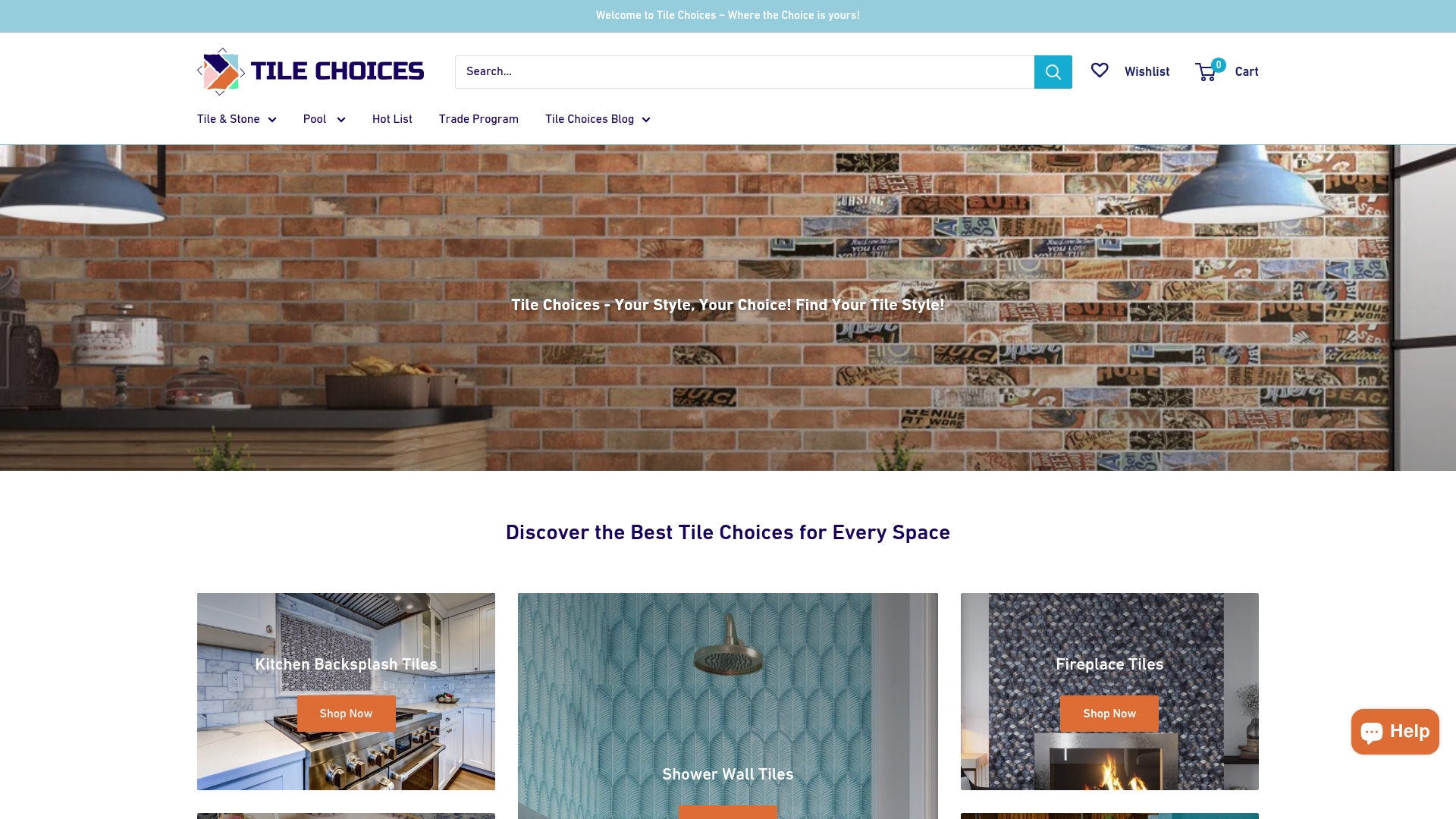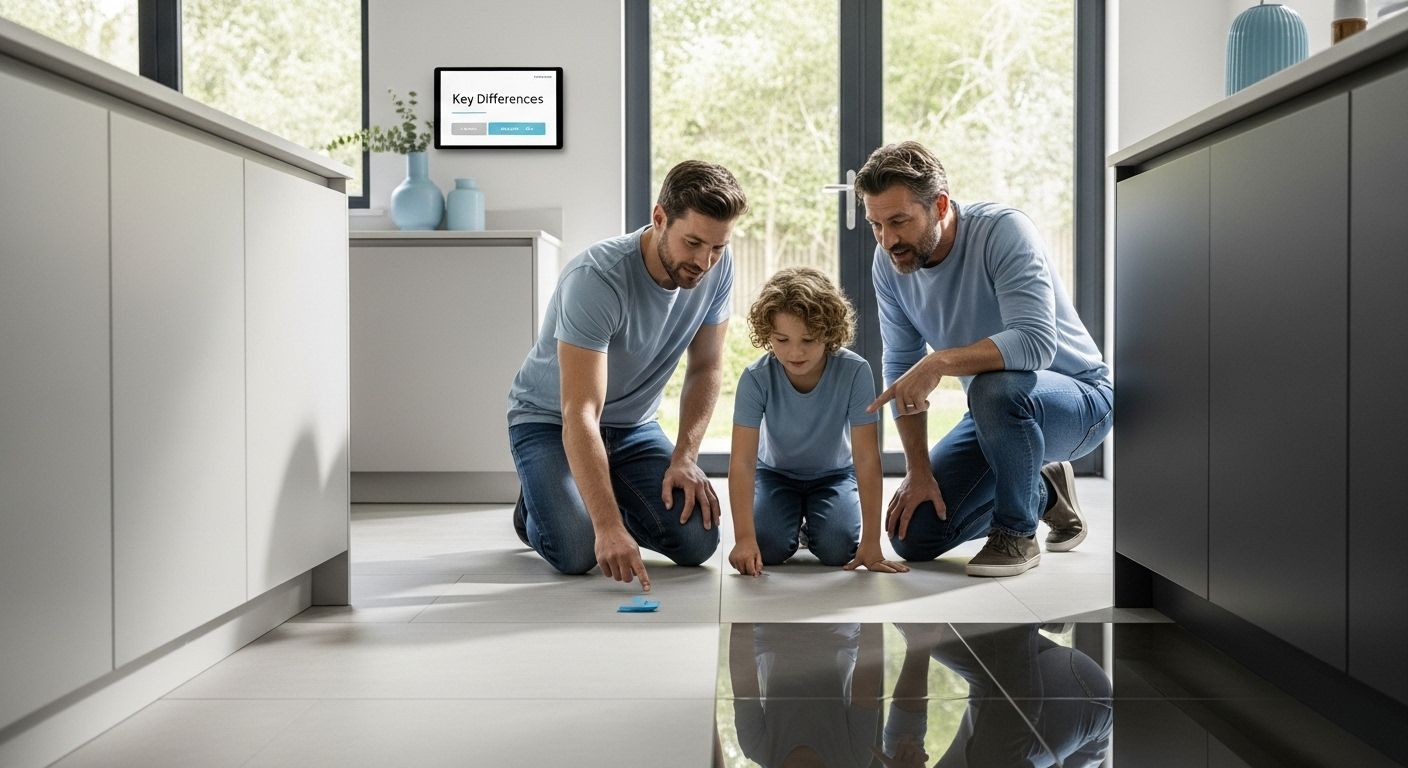Homeowners and designers face a big decision when it comes to tile finishes. The choice between matte and glossy tiles can completely change how a space looks and works. Most people are surprised to learn that matte tiles can hide smudges and imperfections much better, while glossy tiles actually make rooms feel noticeably larger by reflecting light. Everyone expects style to be the only difference, but the real shock is how much these finishes affect safety, cleaning, and the whole mood of a room.
Table of Contents
- What Are Matte And Glossy Tiles? Definitions And Characteristics
- Why Choose One Finish Over The Other? Importance Of Surface Texture
- How Matte And Glossy Tiles Reflect Light: Impact On Ambiance
- Practical Applications: Where To Use Matte Vs Glossy Tiles
- Maintenance And Longevity: Caring For Matte And Glossy Finishes
Quick Summary
| Takeaway | Explanation |
|---|---|
| Matte tiles absorb light and enhance safety. | Their non-reflective surface offers better slip resistance, making them ideal for wet areas like bathrooms and kitchens. |
| Glossy tiles create an illusion of space. | By reflecting light, they make smaller rooms appear larger and brighter, perfect for limited natural light environments. |
| Choose matte or glossy based on maintenance needs. | Glossy tiles are easier to clean, while matte tiles may require more frequent deep cleaning due to higher porosity. |
| Environmental conditions influence tile choice. | Consider factors like moisture levels and foot traffic when selecting between matte and glossy finishes for specific areas. |
| Surface textures impact aesthetic decisions. | Matte provides a subdued elegance, while glossy delivers a more dramatic, high-impact design suited for modern spaces. |
What are Matte and Glossy Tiles? Definitions and Characteristics
Tiles are surface coverings that come in diverse finishes, with matte and glossy being two primary categories that dramatically transform a space’s aesthetic and functionality. Understanding the fundamental characteristics of these tile finishes helps homeowners and designers make informed decisions about their interior design choices.
Surface Finish Fundamentals
Matte and glossy tiles represent opposite ends of the reflectivity spectrum. A matte tile has a non-reflective, soft surface that absorbs light rather than bouncing it back, creating a subdued and understated appearance. In contrast, a glossy tile features a smooth, highly polished surface that reflects light intensely, producing a vibrant and luminous effect.
Visual and Practical Implications
The choice between matte and glossy tiles extends beyond mere visual preference. Matte tiles offer several practical advantages:
- Excellent at concealing smudges, fingerprints, and minor surface imperfections
- Provide better slip resistance, especially in areas prone to moisture
- Create a more relaxed, contemporary aesthetic
Glossy tiles, while visually striking, have their own unique characteristics:
- Enhance perceived space by reflecting light and creating an illusion of openness
- Easier to clean due to their smooth surface
- Ideal for creating dramatic, high-impact design statements
According to Tile Design Magazine, the selection between matte and glossy tiles depends on factors like room function, lighting conditions, and overall design intent. Understanding these nuanced differences empowers homeowners to select tiles that not only look beautiful but also perform optimally in their specific environment.
Below is a comparison table summarizing the key differences between matte and glossy tiles, helping you quickly distinguish their defining features and ideal applications.
| Feature | Matte Tiles | Glossy Tiles |
|---|---|---|
| Surface Appearance | Non-reflective, soft, absorbs light | Highly reflective, polished, emits shine |
| Slip Resistance | Higher, safer in wet areas | Lower, can be slippery when wet |
| Stain Concealment | Hides smudges and imperfections well | Shows smudges and water spots more easily |
| Cleaning & Maintenance | May require deep cleaning, prone to staining | Easier daily cleaning, less porous |
| Aesthetic Effect | Subdued, contemporary, grounded | Dramatic, high-impact, makes rooms feel larger |
| Best Use Cases | Bathrooms, kitchens, outdoor, high-traffic | Small, dark rooms, accent walls, luxury spaces |
| Light Interaction | Absorbs light, creates intimacy | Reflects light, creates openness |
Explore our comprehensive tile finish guide to discover which tile finish best suits your project’s unique requirements.
Why Choose One Finish Over the Other? Importance of Surface Texture
Selecting the right tile finish involves more than aesthetic preferences. Surface texture plays a critical role in determining a tile’s performance, maintenance requirements, and overall suitability for specific environments. Understanding the nuanced implications of matte and glossy finishes helps homeowners and designers make informed decisions.
Performance Characteristics
The surface texture of tiles significantly impacts their functional properties. Matte tiles typically offer superior slip resistance due to their non-reflective, slightly rougher surface. This characteristic makes them ideal for high-moisture areas like bathrooms, shower floors, and outdoor patios where safety is paramount. Glossy tiles, while visually stunning, can become slippery when wet, potentially creating hazardous conditions.
Maintenance and Durability Considerations
Maintenance requirements differ substantially between matte and glossy finishes. According to research published in the National Center for Biotechnology Information, matte tiles demonstrate higher porosity, which impacts their long-term performance:
- More likely to retain stains and require more frequent deep cleaning
- Surface texture makes complete dirt removal more challenging
- Potentially higher maintenance overhead compared to glossy tiles
Glossy tiles, conversely, present different maintenance advantages:
- Smooth surface allows easier cleaning and quicker dirt removal
- Reflective finish helps highlight dirt and grime, making cleaning more straightforward
- Less porous surface reduces long-term staining potential
Aesthetic and Spatial Perception
The choice between matte and glossy tiles extends beyond practical considerations into design psychology.

Glossy tiles create an illusion of expanded space by reflecting light and creating visual depth. They work exceptionally well in smaller rooms or areas with limited natural light. Matte tiles, with their understated elegance, provide a more grounded, contemporary aesthetic that works beautifully in minimalist and industrial design schemes.
Learn more about selecting the perfect tile finish to transform your space with confidence and style.
How Matte and Glossy Tiles Reflect Light: Impact on Ambiance
Light reflection is a critical yet often overlooked aspect of tile selection that dramatically transforms interior spaces. The way tiles interact with light can profoundly influence a room’s perceived size, mood, and overall aesthetic atmosphere. Understanding the science behind light reflection helps designers and homeowners make more intentional choices.
Physics of Light Interaction
Glossy tiles reflect light with remarkable precision, creating sharp, mirror-like reflections that bounce light across the room. According to research in optical physics, these surfaces capture and redirect light at near-identical angles, generating a luminous, expansive effect. This characteristic makes glossy tiles exceptional for smaller or darker spaces where light optimization is crucial.
Spatial Perception and Psychological Impact
Light reflection goes beyond mere visual mechanics. Different tile finishes trigger nuanced psychological responses:
- Glossy tiles create an illusion of depth and openness
- Matte tiles provide a sense of groundedness and intimacy
- Reflective surfaces can make rooms feel larger and more dynamic
Interesting psychological insights reveal that humans are naturally drawn to surfaces with controlled light reflection. Glossy tiles tend to appear more sophisticated and luxurious, while matte tiles communicate understated elegance and contemporary design sensibilities.
Design Strategies for Light Manipulation
Designers strategically use tile reflectivity to achieve specific environmental goals. Matte tiles absorb light, reducing glare and creating softer, more subdued environments. They work exceptionally well in spaces requiring visual calm, such as bedrooms and meditation areas. Conversely, glossy tiles excel in areas needing visual energy and perceived spaciousness, like kitchens and entryways.
Explore our curated tile collections to discover how different finishes can transform your interior spaces.
Practical Applications: Where to Use Matte vs Glossy Tiles
Selecting the right tile finish involves more than aesthetic preferences. Different spaces demand unique surface characteristics that enhance functionality, safety, and visual appeal. Understanding where to strategically deploy matte and glossy tiles can transform interior environments and optimize design outcomes.
High-Traffic and Moisture Zones
In areas exposed to frequent moisture and heavy foot traffic, tile selection becomes critical for safety and durability. According to research published in the National Center for Biotechnology Information, surface finish significantly impacts slip resistance. Matte tiles excel in these environments:
- Bathrooms and shower areas
- Kitchen floors and backsplashes
- Outdoor patios and pool surrounds
- Commercial entryways and hallways
The textured surface provides superior traction, reducing potential slip hazards and offering enhanced safety in wet conditions.
Aesthetic and Spatial Enhancement
Glossy tiles serve specific design and spatial manipulation purposes:
- Small rooms needing visual expansion
- Areas with limited natural light
- Modern, minimalist interior designs
- Accent walls and decorative spaces
- Luxury bathrooms and high-end commercial spaces
Their reflective qualities create an illusion of increased space and depth, making them ideal for creating dramatic visual statements.

Maintenance and Longevity Considerations
Maintenance requirements vary significantly between matte and glossy finishes. Glossy tiles generally offer easier cleaning due to their smooth surface, making them preferable in:
- Kitchen backsplashes
- Food preparation areas
- Spaces requiring frequent sanitization
- Environments with high aesthetic standards
Discover our specialized tile collections to find the perfect finish for your unique space.
Maintenance and Longevity: Caring for Matte and Glossy Finishes
Tile maintenance goes beyond routine cleaning. Understanding the unique characteristics of matte and glossy finishes is crucial for preserving their aesthetic appeal and functional integrity. Proper care ensures your tiles remain beautiful and perform optimally throughout their lifecycle.
The following table organizes the differences in cleaning and maintenance approaches for matte and glossy tiles, outlining recommended techniques and challenges for each surface.
| Cleaning Aspect | Matte Tiles | Glossy Tiles |
|---|---|---|
| Surface Porosity | Higher, more absorbent | Lower, less absorbent |
| Stain Resistance | Prone to stain absorption | Resists staining better |
| Cleaning Tools | May require specialized or deep cleaning | Use soft cloths, avoid abrasives |
| Cleaning Solutions | May need sealants, periodic professional cleaning | Prefer pH-neutral cleaners for glazed surfaces |
| Maintenance Frequency | More frequent deep cleaning needed | Less frequent, routine cleaning usually sufficient |
| Special Precautions | Immediate spill removal, sealing recommended | Prevent surface scratches, wipe dry after cleaning |
Cleaning Techniques and Considerations
Glossy tiles require a distinct approach compared to their matte counterparts. Their smooth, reflective surface demands careful cleaning to maintain its pristine appearance. According to ceramic tile maintenance research, different surface textures necessitate specialized cleaning strategies:
- Use soft microfiber cloths to prevent surface scratching
- Avoid abrasive cleaning tools that can damage the glossy finish
- Select pH-neutral cleaning solutions specifically designed for glazed surfaces
- Wipe surfaces immediately after cleaning to prevent water spot formation
Surface Porosity and Stain Resistance
Matte tiles present unique maintenance challenges due to their higher porosity:
- More susceptible to stain absorption
- Require more frequent deep cleaning
- Need specialized sealants to reduce surface penetration
- Benefit from periodic professional deep cleaning treatments
Long-Term Preservation Strategies
Preserving tile appearance involves more than routine cleaning. Proactive maintenance can significantly extend tile longevity:
- Apply appropriate sealants based on tile material and finish
- Use protective mats in high-traffic areas
- Address spills and stains immediately
- Rotate cleaning tools and techniques to prevent surface wear
Explore our comprehensive tile care guide to learn advanced maintenance techniques for your specific tile finish.
Find the Perfect Matte or Glossy Tile Solution at TileChoices.com
Still deciding between matte and glossy tiles after reading our in-depth guide? You are not alone. Choosing the right tile finish can feel overwhelming, especially when you need the perfect blend of safety, style, and low maintenance. Problems like slippery floors in wet areas, hard-to-clean surfaces, or struggling to achieve your dream design are common concerns many homeowners and designers face.

Step confidently into your next project by exploring the handpicked selections on TileChoices.com. Browse our inspiring curated tile collections to match your space with the ideal matte or glossy finish. Need expert advice? Dive deeper with our comprehensive tile care guide and get practical tips tailored to your tile choice. For stylish upgrades that make a real difference, visit TileChoices.com now and take the first step toward transforming your home with confidence.
Frequently Asked Questions
What are matte tiles, and how do they differ from glossy tiles?
Matte tiles have a non-reflective, soft surface that absorbs light, creating a subdued appearance. Glossy tiles, on the other hand, have a polished surface that reflects light, resulting in a vibrant, high-impact effect.
Which finish is better for slip resistance: matte or glossy tiles?
Matte tiles generally offer better slip resistance due to their slightly rougher texture, making them ideal for high-moisture areas like bathrooms and outdoor spaces. Glossy tiles can be slippery when wet, posing safety risks.
How do I maintain matte and glossy tiles differently?
Glossy tiles require gentle cleaning with soft materials to avoid scratches, while matte tiles may need more frequent deep cleaning due to their porous surface. Using the appropriate cleaning solutions is essential for both finishes.
In what spaces are matte tiles preferred over glossy tiles?
Matte tiles are ideal for high-traffic and moisture-prone areas such as bathrooms, kitchens, and outdoor patios, where slip resistance and concealment of stains are essential. They also enhance a contemporary aesthetic in minimalist designs.





